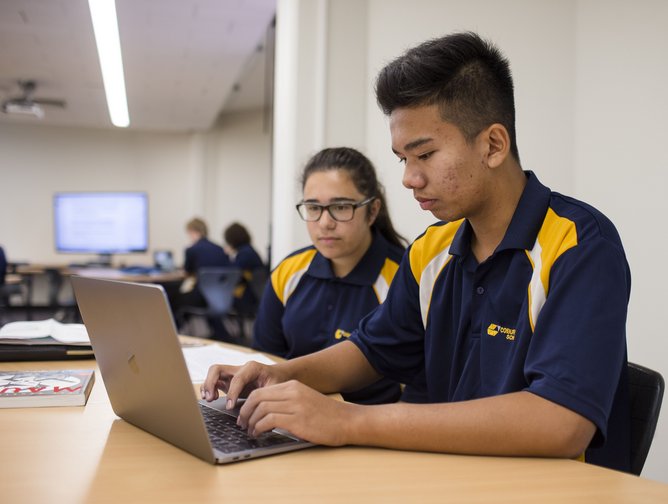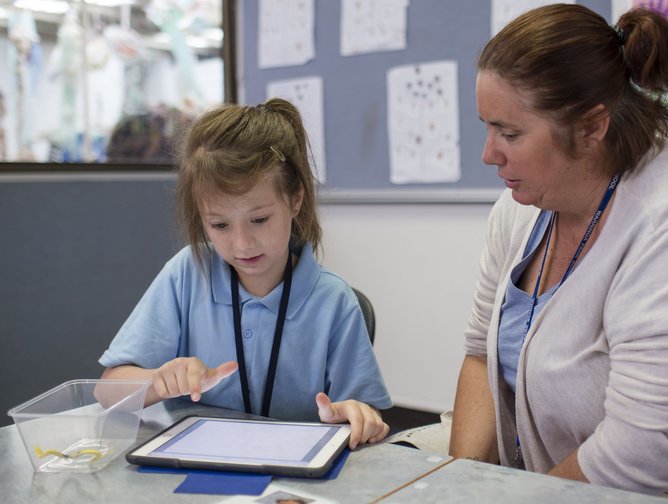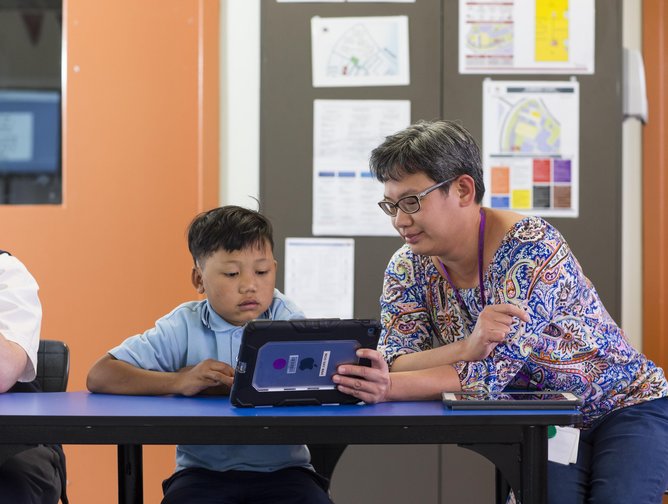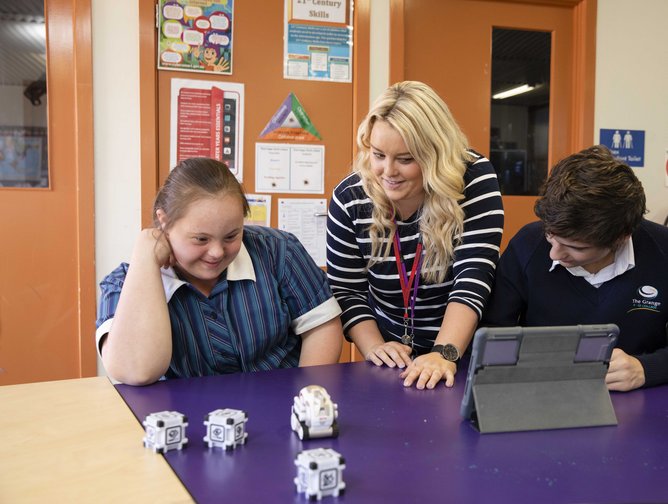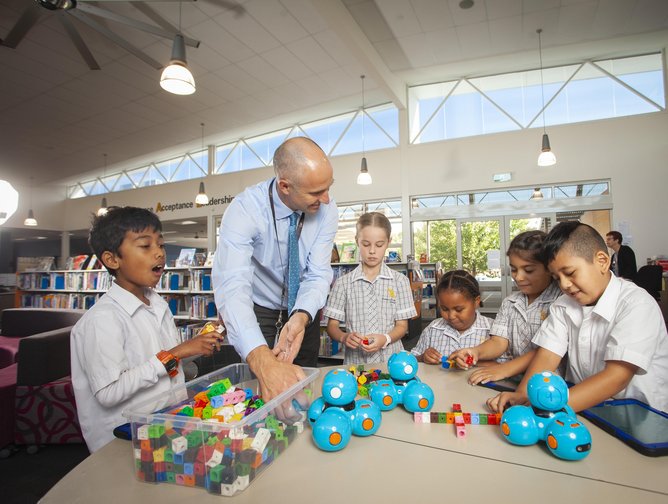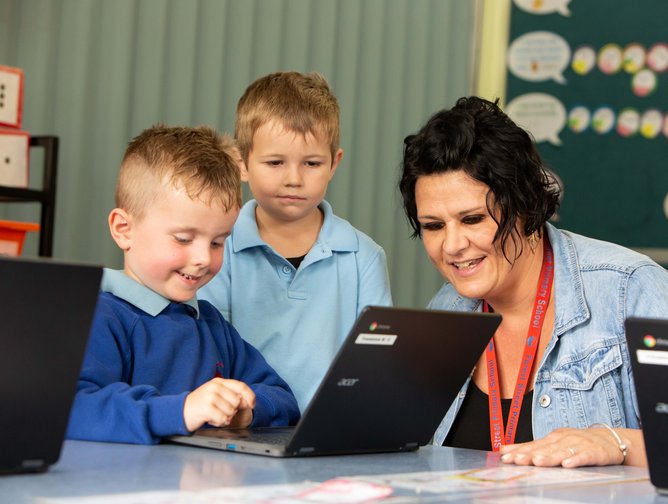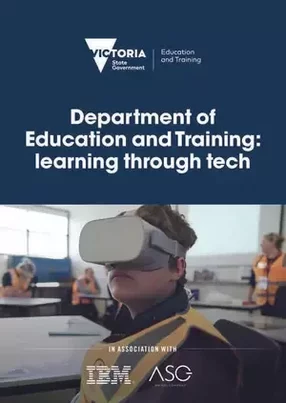Department of Education and Training: learning through tech
The Victorian Department of Education and Training (DET) is responsible for the Victorian State education system. “The Department's remit goes from early childhood through to higher education. For early childhood and higher education, the role is one of governance, policy development, program delivery and allocation of funding to service providers. In the Kindergarten to Year 12 area, the Department also operates almost 1,600 schools. We are a large, complex organisation, and we rely on technology and information to support both teaching and learning and evidence based policy development.”
As CIO, Wilson prizes the role of culture in effecting a successful digital transformation. “We can provide the best technology in the world, but without an inquiring, collaborative culture, it will achieve very little. The role of the CIO should be as much about establishing the right culture as it is about building IT strategies. As CIOs, we have to look more holistically at building capability and technology is only one component. To do this, we need to have the right mindset, the ability to collaborate and we need to consider opportunities for innovation in what and how we do things.” For Wilson, the question of culture is not one that is separate from her other responsibilities; rather it plays into and informs them. “It’s important to take a holistic approach when building information management technology capability. We have four enabling pillars: culture; the technology and information strategies; people capability; and the operating model. You need to look at all four elements – there's no point in doing one without doing the others.”
The focus on culture has had demonstrable effects, evidenced by employee engagement surveys and customer feedback. An important element in changing culture is diversity. “Diversity is extremely important to me. There is a considerable focus on diversity in the Department. This focus is across the Victorian public service with the Workforce Diversity and Inclusion Strategy 2017-2020 which focuses on inclusive and diverse leadership, workforce flexibility, cultural diversity and disability. I always consider diversity in all its forms when recruiting leadership roles, and this has probably had more impact on the culture of the IMT Division than anything, Without diversity in our workforce that creates diversity of thought, innovation is not possible.”
All of this is in service of ensuring education in the State is the best it can be. Wilson sees a pivotal role for technology to play in the classroom, with one of the key benefits coming purely through its presence. “Students will be using technology no matter what career they pursue in the future,” says Wilson. “It's incumbent on the education system to incorporate the use of technology into the everyday classroom.” Technology plays a more active role as well, such as in the provision of data to personalise learning experiences. “Students learn in different ways and the use of technology in formative assessment provides the ability for teachers to understand this and to respond,” she says. “In the classroom, the use of technology not only provides engaging, immersive experiences for students, it enables access to education more equitable than it has ever been.
Information is a big focus for DET, guiding an evidence-based approach to policy making. “We collect a considerable amount of information that is used to inform policy and to assess whether specific programs are effective in improving outcomes,” says Wilson. “We are also doing more in the IoT space now. In looking at schools that are not using online resources we can help identify whether there is a correlation to other environmental factors and respond by providing the appropriate support. Digital is all about data and the ability to manage information and harness its power.”
Directly and positively impacting on learning is gamification, as Wilson explains. “Learning needs to be engaging and fun for students. Technology in the classroom is great for enabling that. Students will become disengaged with their education if they are not able to relate to what they are learning and the use of technology has the potential to represent what is real life and familiar for a student.” DET uses one of the world’s most popular games, in the form of Minecraft, to engage students in learning that provides relevance to them and is linked to curriculum outcomes. “We have a Minecraft Education Edition deployment where one of our virtual learning coaches worked with Minecraft developers in the US to support his development of Minecraft Mini Melbourne and the Archeology Adventure. That was in partnership with the Melbourne Metro Tunnel Project that had all the maps of Melbourne, including subterranean Melbourne. Initiatives like this help keep students engaged and having fun while they're learning.”
To deliver its technology strategies, DET has had the support of a number of partners. Cisco and IBM have delivered collaboration capability with a five-year adoption plan to support teachers in the use of their technology. “We have the largest global deployment of Webex Teams in education, which enables virtual classrooms. This improves the equity factor in schools, with rural and regional schools able to take part in virtual visits to museums and access additional learning opportunities such as languages. It also provides opportunities for our teachers to engage with leading digital teaching practice on a global scale, and receive recognition for their use of the technology in the classroom.”
IBM has partnered with the Department to implement the Connected Learners Program. The engagement of a large-scale delivery partner with significant prior experience in IT infrastructure and logistics enabled the program to successfully deliver a large volume of new and enhanced equipment across geographically dispersed sites. This included the deployment and installation of additional wireless access points in schools and the delivery and installation of the largest global deployment of Webex smartboards to every Victorian government school. The partnership also incorporates a five year adoption program to support teachers in the use of the smartboards and Webex Team application in the classroom – creating the ability for schools and students to collaborate and create a virtual learning environment.
Consultant Deloitte has also worked with DET on a capability review and frameworks to inform the future information management and technology strategies at the organisation. The ASG Group, meanwhile, manages the Department’s Oracle environment that supports Finance, Payroll and Procurement functions. “DET processes one of the largest payrolls in Victoria, with over 132,000 payment summaries issued last financial year. The payroll includes approximately 70,000 teachers as well as staff at two other government departments. ASG, in addition to providing managed services for Department’s Finance, HR, Payroll and Procurement systems, provides the Department with managed ICT services supporting the Department’s core Microsoft based technologies and the Department’s ICT security services.”
And as DET carries out its cloud-first investment principle, it is pivoting away from infrastructure investment and management. As Wilson explains: “We're increasingly moving up the stack from infrastructure as a service through platform as a service, and some software as a service. The Department has recently selected Salesforce as the enterprise platform for customer relationship management. The first implementation of Salesforce will be to support the Kindergarten Information Management System. Department staff are currently working with Salesforce to build internal capability on the platform and plans are underway to transition other CRM requirements to the platform. The Department has also selected MuleSoft, another Salesforce company, to meet the integration platform needs of the Department. The recent acquisition of Tableau by Salesforce, which is also used within the Department, means Salesforce is one of the largest strategic technology partners for the Department. The Department is excited to be working with Salesforce to optimise its agility and responsiveness across a very complex environment.”
Currently, DET is leading a program to improve services to children and families through the use of technology. “This encompasses the linkage of information about children to better inform services that are delivered to children and families. To achieve this, information from the Department of Health and Human Services and other children and family service providers is being linked to give service providers better insight into that particular child or family circumstances.” Initiatives such as these are focused on fulfilling DET’s overall mission: “that is making sure that Victorians have equitable access to quality education and training from birth to adulthood.”
